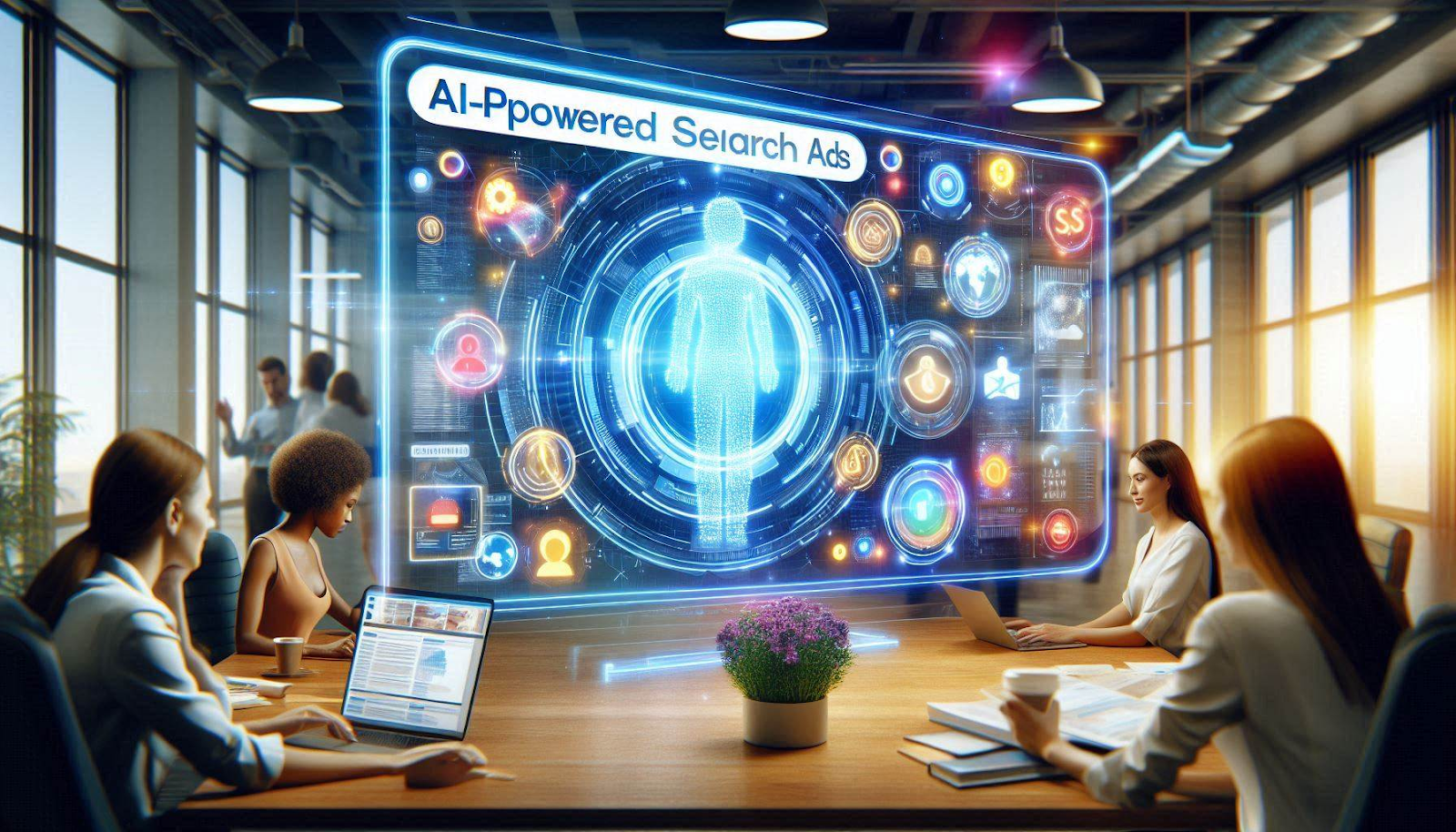AI-powered search ads have completely changed how businesses approach digital advertising. By using artificial intelligence, these ads allow marketers to target their audience with incredible accuracy and speed. In simple terms, AI helps businesses show the right ads to the right people at the right time, making advertising more effective than ever before.
Table of Contents
Understanding AI-Powered Search Ads
AI-powered search ads are changing the way businesses advertise online. They use smart technology, like machine learning and complex algorithms, to make sure ads perform better. Unlike regular search ads, which need a lot of manual work, AI-driven ads can analyze huge amounts of data and adjust quickly to deliver ads that are more relevant to the right people.
Let’s break down the key parts of AI-powered search ads:
1. Data-Driven Insights
AI looks at lots of data to understand how people behave online, what they like, and what they have searched for before. This means AI can get a clear picture of what different customers want and show them ads that are more likely to grab their attention. For example, if someone has been searching for home decor ideas, AI will recognize that and show them ads for furniture or decoration items.
2. Real-Time Adjustments
One of the best features of AI is how quickly it can react. Unlike traditional ads, where marketers might need to wait days or even weeks to see results, AI can make changes on the spot. If certain keywords are trending or people’s search habits change, AI can automatically tweak the ad’s placement, update the bid amount, or even change the wording of the ad to make it more appealing. This helps marketers stay flexible and keep up with the fast-paced world of online advertising.
3. Automation
AI-powered search ads take care of many tasks that would normally need a marketer’s attention. Things like adjusting bids, choosing the right keywords, or testing different ad copies can be automated by AI. This reduces the manual effort marketers need to put in and frees up their time to focus on bigger-picture strategy. Instead of spending time on routine tasks, marketers can concentrate on creative ideas and planning, knowing that the AI system is handling the details.
Benefits of AI-Powered Search Ads
AI-powered search ads offer a bunch of benefits that can really help marketers get better results. Here’s a closer look at the key advantages:
1. Enhanced Targeting
One of the best things about AI is its ability to find the perfect audience for your ads. AI looks at lots of data—like who’s searching for what, where they are, and what they’ve clicked on before—to figure out exactly who’s most likely to be interested in your product or service. This means your ads don’t just go to anyone—they’re shown to people who actually care about what you’re offering. So, when you run ads, you’re not wasting time or money showing them to the wrong people. The right people see the right ads, at the right time.
2. Cost Efficiency
AI helps businesses save money on ads by making sure every dollar counts. It does this by automatically adjusting things like how much you bid for a spot in search results. AI makes sure you’re not overpaying for ad space while also preventing your ad from getting ignored. By focusing on the right audience and getting the most out of each click, AI ensures that your budget goes further and gives you a better return on investment (ROI). You spend less, but get more back in results.
3. Real-Time Optimization
AI doesn’t just set your ad campaign and forget about it. It’s always learning from what happens in real time. For example, if an ad starts getting a lot of clicks, the AI can immediately adjust your campaign to take advantage of that. Or, if something isn’t working, it can make quick changes to improve things. This means that your ads are constantly improving, without you having to make all the adjustments yourself. Over time, this leads to better results because the system is always fine-tuning things based on what people are doing.
How Marketers Use AI-Powered Search Ads to Accomplish Their Business Goals

AI-Powered Keyword Targeting
AI-powered keyword targeting is a game-changer for marketers, especially when it comes to managing and optimizing search ads. It makes the process easier and more effective by using smart technology to find the best keywords. Here’s how it works:
1. Dynamic Keyword Suggestions
AI tools can automatically recommend keywords that are performing well, based on real-time search data and trends. Instead of spending time guessing which words might work, AI looks at what people are searching for right now and suggests keywords that are more likely to drive traffic. This helps marketers stay up-to-date and avoid wasting time on keywords that aren’t relevant.
2. Predictive Performance Insights
AI doesn’t just recommend keywords—it also predicts how well those keywords will do. By analyzing past data, AI can forecast which keywords are most likely to get clicks or lead to sales. This reduces the guesswork for marketers, so they don’t have to test out as many keywords to see what works. Instead, they can focus on the keywords that are most likely to bring in results, saving time and effort.
Optimizing Ad Copy with AI
Optimizing ad copy with AI is a smart way to make your ads more effective and appealing. Creating strong, eye-catching ad copy is key to a successful campaign, and AI makes this process easier and faster. Here’s how it works:
1. Automated Ad Creation
AI tools, like those in Google Ads, can automatically create ad headlines and descriptions that are both relevant and engaging. Instead of manually writing each ad, AI can generate multiple versions that are tailored to your audience. These ads are based on what’s likely to attract attention and drive clicks, helping marketers create more effective campaigns with less effort.
2. A/B Testing at Scale
One of the challenges of running ads is figuring out which message works best. AI makes this easier by running multiple versions of an ad (called A/B testing) at the same time. It tests different headlines, descriptions, and images to see which ones perform the best. By analyzing the results, AI quickly identifies the best-performing content, so marketers don’t have to manually test each variation.
3. User Intent Customization
AI can also customize ads to match what a user is searching for. For example, if someone is looking for a discount on running shoes, AI can show an ad with a special promotion on running shoes. This type of personalization helps make the ad more relevant to the user, which can increase the chances they’ll click on it. By aligning ads with what people actually want, marketers see higher click-through rates (CTR) and better overall results.
Audience Segmentation and Personalization
Audience segmentation and personalization are key to making sure ads are more relevant and effective. AI helps marketers understand their audience better and create ads that speak directly to individuals. Here’s how AI works in this area:
1. Advanced Segmentation
AI can break down audiences into smaller, more specific groups based on things like age, location, interests, and even past purchases. Instead of treating everyone the same, AI looks at data and sorts people into categories that make sense for the business. This allows marketers to target the right group with the right message, ensuring the ad is relevant to that particular audience. For example, AI might identify that a group of people who recently bought running shoes are more likely to be interested in new workout gear.
2. Personalized Ad Experiences
AI doesn’t stop at just sorting people into groups—it also tailors the ad experience to each person. By using the insights it gathers, AI can show ads that are more likely to catch someone’s attention. For instance, if someone has been browsing online for discounts on coffee makers, AI will show them an ad for a special deal on coffee machines. This personal touch makes users feel like the ad is made just for them, increasing the chances they’ll engage with it.
Predictive Analytics for Campaign Planning
Predictive analytics is a powerful tool that AI brings to the table for campaign planning. It helps marketers forecast what might happen in the future, so they can make better decisions and improve their campaigns. Here’s how it works:
1. Performance Predictions
AI can predict important numbers, like click-through rates (CTR), conversion rates, and cost-per-click (CPC), even before the campaign fully runs. By looking at past data, AI can give marketers a good idea of how their ads will perform. For example, if AI predicts a high CTR, marketers can feel confident that their ads are likely to grab attention. This helps businesses plan better and avoid surprises, like spending too much on ads that don’t work.
2. Identifying Trends
AI can also spot patterns in data that humans might miss. It looks for trends in user behavior, like which keywords are gaining popularity or what type of content is getting more attention. By catching these trends early, AI lets marketers adjust their campaigns in real-time. For example, if AI detects that a particular product is trending, marketers can quickly update their ads to focus on that product, staying ahead of the competition.
Dynamic Bid Adjustments
Dynamic bid adjustments powered by AI help marketers get the most out of their advertising budget by making smart changes to bids in real-time. This ensures ads are shown in the best spots without overspending. Here’s how it works:
1. Smart Bidding
AI automatically adjusts bids to prioritize the best ad placements. It focuses on spots where the ad is more likely to lead to a click or a sale. For example, if AI recognizes that a particular time of day or specific audience is more likely to convert (buy or take action), it will automatically increase the bid for that placement. This way, you’re not wasting money on spots that aren’t performing well, and you’re maximizing the chance of getting valuable clicks.
2. Reducing Overspending
AI helps prevent overspending by constantly monitoring and adjusting your bids. Instead of setting a fixed bid for all ads, AI looks at each auction and decides how much to bid based on the likelihood of success. If an ad placement isn’t performing well, AI will lower the bid to save money. This ensures that the budget goes only where it’s most likely to generate the best results, keeping spending efficient.
Performance Monitoring and Reporting
AI tools make it easier for marketers to track and understand how their ads are performing. Instead of manually checking data, AI does a lot of the heavy lifting, so marketers can focus on improving their campaigns. Here’s how it helps:
1. Insightful Metrics
AI dashboards show key information about how well a campaign is doing, like how many people are clicking on the ads, how much each click costs, and how often the ad leads to a sale. These insights are easy to understand and give marketers a clear picture of what’s working and what’s not. This helps them make quick changes to improve the campaign—like adjusting the message or targeting different people—so they can get better results.
2. Automated Reporting
Instead of spending hours creating reports, AI can automatically generate detailed reports about the campaign’s performance. These reports are often in a simple format, so marketing teams can easily understand the results. AI saves time by handling all the number-crunching and presenting the data in a way that’s easy to digest. This way, marketers don’t have to waste time gathering and analyzing data; they can focus on using the insights to improve their ads.
Integration with Other Marketing Channels
AI-powered search ads don’t just work on their own—they can work together with other marketing channels to make the entire marketing strategy stronger. Here’s how AI helps connect search ads with different parts of marketing:
1. SEO Efforts
AI helps improve website content by analyzing data from search ads and using it to boost organic rankings on search engines. When marketers see which keywords are driving the most traffic to their ads, they can apply that knowledge to improve the website content. By using the same keywords and topics in their website pages, they can help their site show up higher in search results, even without paying for ads.
2. Social Media Ads
AI-powered search ads also help improve social media advertising. By analyzing data from both search ads and social media ads, AI can provide insights on how people are responding across different platforms. This helps marketers create more unified campaigns that are consistent across all channels. For example, if a certain message or product is doing well in search ads, AI can suggest using the same strategy for social media ads to reinforce the campaign.
3. Email Marketing
AI also connects search ads with email marketing. By tracking ad performance, AI can show how people who clicked on an ad are engaging with emails. This means marketers can send follow-up emails that match the products or services people have shown interest in. The combination of targeted search ads and personalized email marketing creates a stronger connection with customers, leading to better engagement and higher conversion rates.
Use Cases of AI-Powered Search Ads
AI-powered search ads are being used by marketers in many different industries to achieve great results. By using smart technology, businesses can create ads that are more relevant, personal, and effective. Here’s how different industries are benefiting:
1. Retail
In retail, AI-powered search ads are helping businesses show hyper-targeted ads for specific products. For example, if someone searches for “best winter jackets,” AI can show them ads for jackets that match their size, style, and price range. Retailers can fine-tune their ads to reach people who are most likely to buy, which leads to higher sales and a better shopping experience for customers.
2. Travel
For the travel industry, AI-powered search ads are great at offering personalized trip recommendations. If someone is searching for flights to a tropical destination, AI can show them ads for vacation packages, hotels, or even activities that match their interests. By using data like past travel searches or favorite destinations, AI can make sure travelers see the most relevant options, making it easier for them to plan their perfect trip.
3. Technology
In the tech industry, AI is used to promote software solutions to niche audiences. For example, a company selling project management software could use AI to target ads to business owners or managers who are most likely to need it. AI helps tailor ads to the right people based on their job roles, industries, and past behaviors, so the software is shown to those who will benefit most from it. This leads to higher engagement and better chances of converting leads into customers.
4. Healthcare
In the healthcare industry, AI-powered search ads are helping medical providers target people who are looking for specific health services. For example, if someone is searching for “dentists near me” or “best weight loss programs,” AI can show them ads for local clinics, doctors, or health products that match their needs. By using AI to understand the type of care a person is looking for, healthcare providers can show ads that are both relevant and helpful, leading to better patient engagement.
5. Education
In the education sector, AI is used to promote courses, degrees, and training programs to the right students. For example, if someone is searching for “online marketing course,” AI can show them ads for relevant educational programs that match their career goals or interests. By using AI to analyze student interests, past searches, and location, educational institutions can offer personalized ads for courses that are most likely to lead to enrollments, making it easier for students to find the right learning opportunities.
Common Challenges and How to Overcome Them
While AI-powered search ads offer a lot of benefits, there are also some challenges businesses need to keep in mind. Here are a few common ones and how to handle them:
1. Data Privacy Concerns
One of the biggest concerns with AI-powered ads is how data is used. Since AI relies on data to target the right audience, businesses must make sure they’re using that data in a safe and ethical way. To overcome this challenge, companies should follow privacy rules and regulations like the General Data Protection Regulation (GDPR) to protect customer data. It’s important to be transparent with customers about how their data is used and to give them control over it. By respecting privacy and complying with laws, businesses can avoid issues and build trust with their customers.
2. Over-Reliance on Automation
AI can automate a lot of tasks, but it’s important not to rely on it completely. While AI helps with things like bidding, ad placement, and keyword targeting, marketers still need to make strategic decisions and ensure that the AI is working toward the business’s overall goals. To overcome this, businesses should maintain human oversight. Marketers should regularly check how the AI is performing and adjust campaigns when needed to keep things aligned with their objectives.
3. Learning Curve
AI tools can seem complicated at first, and there’s often a learning curve for businesses trying to use them. To make the most out of AI-powered search ads, businesses should invest in training for their marketing teams. By understanding how AI works and how to use its features, marketers can improve their campaigns and see better results. Offering training or even hiring experts to guide the team can help everyone feel more confident and capable of using AI tools effectively.
Future Trends in AI-Powered Search Ads
The future of AI-powered search ads looks really promising, with several trends that are set to change the way businesses reach customers. Here’s what we can expect:
1. Voice Search Integration
As more people use voice assistants like Siri, Alexa, and Google Assistant to search the web, voice search is becoming a big deal. In the future, AI-powered search ads will need to be optimized for voice queries. Since voice searches tend to be more conversational, businesses will have to adjust their ads to sound natural and fit the way people speak. For example, instead of typing “buy shoes online,” someone might say, “Where can I buy running shoes near me?” AI will help businesses make sure their ads show up when people search by voice, making it easier to connect with customers.
2. Machine Learning Advancements
AI and machine learning are constantly getting better, and as these technologies evolve, AI-powered search ads will become even smarter. Future advancements in AI algorithms will allow businesses to target their ads more accurately, reaching the right people at the right time. These improved algorithms will provide deeper insights into consumer behavior and trends, allowing businesses to create even more personalized and effective campaigns. As machine learning gets more advanced, AI will continue to refine ads to maximize performance and return on investment.
Practical Tips for Marketers
Here are some practical tips that marketers can use to get the best out of AI-powered search ads:
1. Leverage Tools Like Google Ads and Microsoft Advertising’s AI Features
Both Google Ads and Microsoft Advertising offer powerful AI features that help automate and improve your search ads. Make sure you’re taking full advantage of these tools. They offer smart bidding, keyword suggestions, and other AI-driven features that can make your campaigns run more smoothly. By using these platforms, marketers can save time, reduce manual work, and ensure ads are shown to the right people. Don’t hesitate to explore these features and experiment with them to see what works best for your business.
2. Focus on Data Quality
AI relies heavily on data to make decisions, so it’s important to make sure the data you’re using is accurate and clean. If the data isn’t reliable, AI predictions won’t be either. Take time to ensure that the data you collect—such as user behavior, demographics, and purchase history—is correct and up-to-date. This will allow AI to make smarter, more accurate decisions about things like bidding, targeting, and messaging. Better data equals better results from your AI tools.
3. Regularly Monitor Campaigns and Adjust Strategies Based on AI Insights
AI helps automate a lot of things, but it’s still important to keep an eye on your campaigns. Regularly monitor how your ads are performing and use the insights AI provides to adjust your strategies. AI can tell you what’s working and what’s not, but it’s up to you to act on those insights. If a certain ad isn’t performing well, AI might suggest tweaking it, and you should be ready to make those changes. Keep testing, learning, and adjusting to keep improving the performance of your ads.
FAQs
1. What are AI-powered search ads?
AI-powered search ads are advertisements that use artificial intelligence (AI) and machine learning to automatically improve and optimize how they perform. Instead of marketers having to manually make changes to ads, AI analyzes data and adjusts things like targeting and bidding in real-time to make sure the ads are shown to the right people at the right time. This helps the ads work better without much human effort.
2. How do AI search ads improve ROI?
AI search ads can help businesses get a better return on investment (ROI) by making ads more effective. First, AI helps target the right audience—people who are most likely to click on your ad or buy something. It also adjusts bids automatically, so businesses don’t waste money bidding too high for unimportant placements. By optimizing these factors, AI helps businesses get more value from their ad spend.
3. Can AI replace human marketers?
No, AI doesn’t replace human marketers. While AI can do things like automate repetitive tasks and analyze large amounts of data quickly, it still needs human expertise. Marketers are still needed to make creative decisions, strategize, and ensure that the ads align with the business’s goals. AI helps marketers work smarter, but it doesn’t take their job away.
4. Are AI-powered search ads suitable for small businesses?
Yes, AI-powered search ads are perfect for small businesses! One of the great things about AI is that it offers scalable solutions, meaning it works for businesses of all sizes, including small ones. Small businesses can use AI to get the same benefits as larger businesses—such as better targeting and automatic optimizations—without needing a huge budget or a large team. It’s an affordable and effective way for small businesses to improve their advertising efforts.
5. How does AI help with keyword research?
AI makes keyword research easier by predicting which keywords are likely to perform the best based on real-time data. Instead of guessing or spending too much time testing different keywords, AI can analyze trends and user behavior to suggest high-performing keywords that will help your ads show up for the right searches. It can also suggest new keyword opportunities that marketers may not have considered, improving the overall campaign.
6. What tools can I use for AI-powered search ads?
There are several tools you can use to run AI-powered search ads. Some of the most popular platforms include Google Ads and Microsoft Advertising, both of which offer AI features to help optimize your ads. If you’re looking for third-party tools, platforms like Adzooma also offer AI-powered features to manage and improve your ads. These tools make it easier for marketers to take advantage of AI without having to build everything from scratch.
Conclusion
AI-powered search ads are a game-changer for marketers, offering unparalleled efficiency, targeting, and personalization. By embracing AI technology, businesses can streamline their advertising efforts, achieve their goals, and stay competitive in an ever-evolving digital landscape.




